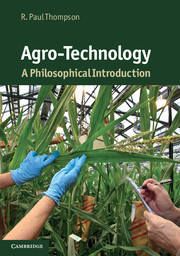Book contents
- Frontmatter
- Contents
- List of figures
- List of tables
- Preface
- Introduction
- 1 Scientific background
- 2 Application of genetics to agriculture
- 3 Philosophical and conceptual background
- 4 The controversy
- 5 The controversy
- 6 The controversy
- 7 The organic alternative
- 8 Impacts on low- and middle-income countries
- Concluding remarks
- Bibliography
- Index
7 - The organic alternative
Published online by Cambridge University Press: 05 June 2012
- Frontmatter
- Contents
- List of figures
- List of tables
- Preface
- Introduction
- 1 Scientific background
- 2 Application of genetics to agriculture
- 3 Philosophical and conceptual background
- 4 The controversy
- 5 The controversy
- 6 The controversy
- 7 The organic alternative
- 8 Impacts on low- and middle-income countries
- Concluding remarks
- Bibliography
- Index
Summary
This chapter examines the purported benefits of organic agriculture – environmental and health benefits – to avoid confusion, it must be noted, at the outset, that the term ‘organic’ in chemistry has a different meaning than in agriculture; organic chemicals are those containing carbon. I use the expression ‘organic agriculture’ rather than ‘organic farming’. This is deliberate; ‘organic farming’ conjures up for many the image of the family farm – a small operation with a few cows, goats, sheep, pigs and chickens, all of which roam free in the pasture, and a vegetable plot managed by family members. There are, of course, still a few such operations, but organic agriculture has become big business; it is an agricultural business in every sense that conventional agriculture is. It is because of this that nearly every large and small grocery store across North America and Europe has been able to supply customers, daily, with an array of organic products. Moreover, the rapid growth and current magnitude of organic agriculture has warranted the commitment of time and financial resources to formulate policies and regulations and to engage in inspection and enforcement.
In what follows, I separate GM agriculture from conventional agriculture; advocates of organic agriculture lump them together, portraying them both as the antithesis of organic. This, I argue, results in a crude analysis that undermines creative approaches to meeting the serious challenges facing agriculture, health promotion and environmental remediation. As we shall see, much of the attractiveness of the case mounted in support of the benefits of organic agriculture rests on ‘intuition’ and anecdotes. Since organic agriculture avoids chemicals and ‘factory farming’, it seems intuitively obvious that this must reduce environmental impact and produce healthier food; after all, having no chemicals means less environmental pollution – and, hence, more sustainable farming – and eliminating all those chemical residues from food will, obviously, make them less damaging to one's health. Intuitions, however, as we have seen and will see again here, are a poor substitute for empirical evidence; this is a message that has been reinforced in contexts as diverse as medical practice and military strategy over the last several hundred years.
- Type
- Chapter
- Information
- Agro-TechnologyA Philosophical Introduction, pp. 178 - 198Publisher: Cambridge University PressPrint publication year: 2011

